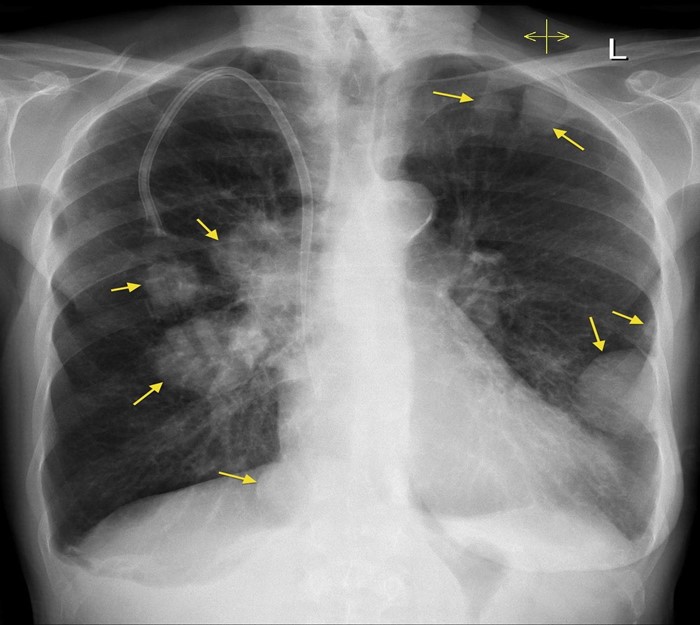A male client is admitted with difficulty breathing related to a recent diagnosis of metastatic lung cancer. He tells the nurse that he does not want to be hooked up to any machines. His vital signs are heart rate 120 beats/minute, blood pressure 98/50 mm Hg, respirations 30 breaths/minute, and oxygen saturation 88%. Which action should the nurse take?
Obtain the client's legal records for power of attorney.
Give analgesic medications as needed (PRN).
Discontinue the intravenous infusion.
Ask the palliative care team to speak with the client.
The Correct Answer is D
Choice A Reason: This is not the first priority because it does not address the client's immediate needs. The nurse should obtain the client's legal records for power of attorney, but this can be done later.
Choice B Reason: This is a good action because it helps relieve the client's pain and discomfort. The nurse should give analgesic medications as needed (PRN), but this is not enough to meet the client's holistic needs.
Choice C Reason: This is not an appropriate action because it may cause harm to the client. The nurse should not discontinue the intravenous infusion without a valid reason and a healthcare provider's order.
Choice D Reason: This is the best action because it respects the client's wishes and provides him with quality end-of-life care. The nurse should ask the palliative care team to speak with the client and offer him emotional, spiritual, and physical support.

Nursing Test Bank
Naxlex Comprehensive Predictor Exams
Related Questions
Correct Answer is B
Explanation
Choice A Reason: Beginning initial sterile wound care for surgical clients is a nursing intervention that requires clinical judgment and cannot be delegated to the PN. The PN may assist with wound care after the initial dressing change, but the RN is responsible for assessing the wound and initiating the plan of care.
Choice B Reason: Validating prescribed intravenous flow rates is a routine task that does not require clinical judgment and can be delegated to the PN. The PN has the knowledge and skill to check the IV orders, calculate the drip rate, and monitor the infusion.
Choice C Reason: Determining the need for urinary catheterizations is a nursing assessment that requires clinical judgment and cannot be delegated to the PN. The PN may perform urinary catheterizations as ordered by the physician, but the RN is responsible for evaluating the indication, risk, and benefit of the procedure.
Choice D Reason: Receiving a postoperative client and conducting the assessment is a nursing intervention that requires clinical judgment and cannot be delegated to the PN. The RN is responsible for receiving reports from the operating room, assessing the client's status, identifying potential complications, and initiating the plan of care.
Correct Answer is A
Explanation
Choice A Reason: This is the correct answer because the client's vital signs indicate that she is hypovolemic and dehydrated due to the leakage of gastric contents from the anastomosis site. The nurse should replace fluids intravenously to prevent shock and electrolyte imbalance.
Choice B Reason: Recording the amount of daily wound drainage is important but not the most important intervention for this client because it does not address the immediate problem of fluid loss and hypovolemia. The nurse should monitor the wound drainage for signs of infection and report any changes to the physician.
Choice C Reason: Assessing skin condition and turgor for breakdown is important but not the most important intervention for this client because it does not address the immediate problem of fluid loss and hypovolemia. The nurse should assess the skin for signs of dehydration and pressure ulcers and provide appropriate skin care.
Choice D Reason: Turning every 2 hours around the clock from side-to-side is important but not the most important intervention for this client because it does not address the immediate problem of fluid loss and hypovolemia. The nurse should turn the client to prevent complications such as pneumonia and atelectasis but also consider the client's comfort and pain level.

Whether you are a student looking to ace your exams or a practicing nurse seeking to enhance your expertise , our nursing education contents will empower you with the confidence and competence to make a difference in the lives of patients and become a respected leader in the healthcare field.
Visit Naxlex, invest in your future and unlock endless possibilities with our unparalleled nursing education contents today
Report Wrong Answer on the Current Question
Do you disagree with the answer? If yes, what is your expected answer? Explain.
Kindly be descriptive with the issue you are facing.
